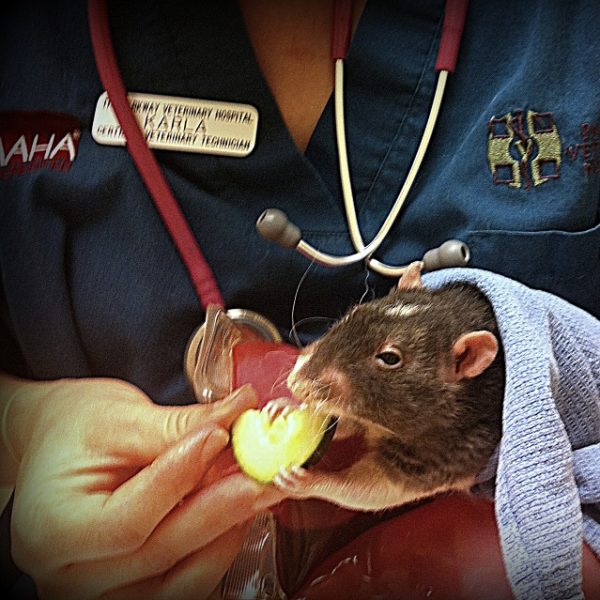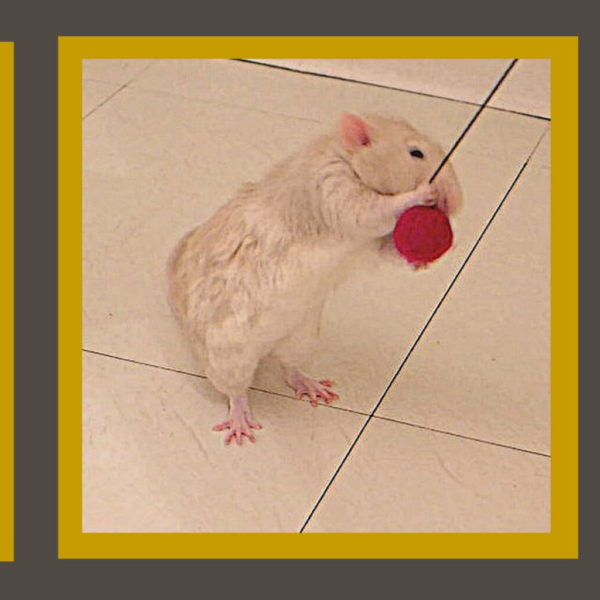Most human allergies to pet rats are caused by contact with rat urine, saliva and skin dander. All of these substances can be found on a rat’s fur, under their nails as well as  inside their cage. In addition, pet rat urine, saliva and skin dander can dry up, flake off and become airborne.
inside their cage. In addition, pet rat urine, saliva and skin dander can dry up, flake off and become airborne.
Many people experience skin rashes wherever they’ve been in direct contact with pet rats. Other common allergic reactions include difficulty breathing, congestion and sneezing.
Some humans find hairless rats either don’t produce symptoms at all or they at least reduce the allergic reactions. Double Rex and sometimes even Rex rats can also be more tolerable for those who have allergies. Female rats tend to have less oily skin and may cause less allergy-related symptoms. None of these potential solutions are guaranteed, however. It really depends upon both the individual rat and the person who’s experiencing the allergies.
If you or a family member has allergic reactions to your pet rats, here are the top three things you can do:

1. Make Physical Contact Safer
Often, allergic individuals can still spend time with pet rats as long as safeguards are put in place. The following tips are especially helpful for those who develop skin reactions such as hives and rashes after touching rats:
- Wear clothing that covers any skin that comes into contact with rats.
- Wear gloves. These can be cotton gloves or sturdier, gardening gloves. Some people can even find relief just by wearing fingerless gloves.
- Refrain from rubbing your eyes while with pet rats and especially after touching them.
- Change clothes immediately after being with rats. Either put away the clothes to wear again next time or launder them right away.
- Wash hands, arms, neck, face and any other part of your body that’s come in contact with rats as soon as you finish interacting with them.
- Keep rats in a room as far away as possible from where the person with allergies is sleeping.
- Bathe pet rats weekly. Use baby shampoo and be sure to rinse well afterwards. Some say just soaking their rats in warm water helps alleviate human allergies to pet rats.
2. Clean More Thoroughly & More Frequently to Reduce Human Allergies to Pet Rats
- If possible, have someone else clean your rats’ cage if you’re allergic. In cases where no one else is available, wear a surgical mask while cleaning to reduce inhaling allergens.
- Your rats’ cage should be cleaned every day. Replace anything soiled with new/fresh items. You can also start out by changing everything in their cage daily whether or not it’s soiled. If this helps, try changing everything every 2-3 days (instead of daily) and see if the allergic reactions are still improved. If not, return to thoroughly cleaning and changing boxes, bedding, litter, etc. on a daily basis.

- Use cloth bedding. Depending on what you’re currently using, you could be allergic to their bedding rather than your rats. Cotton T-shirts, fleece blankets, sheets and towels are all excellent choices for alleviating human allergies to pet rats.
3. Medications May Help
- Over-the-counter medication options:
- Clariton, (an antihistamine,) works very well for many people. Other over-the-counter allergy medications include Zirtec and Benedryl.
- Nasal spray with antihistamines and decongestants may also be quite effective.
- Check with your doctor about any medications that can be prescribed to alleviate allergies to pet rats. Sometimes an inhaler can be very helpful.








Hi! Ive rescued my two female rats a year ago and have never had any issues. (maybe a hive or 2 while cleaning their cage but it always went away quickly.) Unfortunately, within the last 3 months I have had tremendous breathing problems that only seem to improve when I’m away from my room/house. I didn’t even think it was due to my rats until I broke out in hives all over my neck and chest after moving their cage. Im not sure what to do because they are both 2 years old and no rat rescue will take them in my state due to their “old age.” :( Im so sad and I’m not sure how to handle this.
Hi Savannah,
I really feel for you. It’s terrible when you develop an allergy to your beloved pet rats.
Can you please let me know what you’ve already tried? There are a number of action items contained in the above post that could help you. To give you additional tips, I need to first learn what you’ve tried so far.
Without knowing what you’ve already done, the first thing I would personally try would be to take some Benadryl when you’re around your rats. That way you’ll be able to tolerate them. Taking the Benadryl should only be a short-term solution, though. I would try all of the above suggestions one at a time and see if your symptoms are alleviated. To find out, you would of course have to stop taking the Benadryl to see if what you’ve tried helps.
I’m happy to walk you through further steps if you’d like to let me know what you’ve already attempted.
Sending positive wishes for alleviating your allergic reactions to your rats,
Jasmine | About Pet Rats
I am going to meet with a family that owns 3 female rats. And if I don’t have an allergy to them, I will be getting rats a few days later. I already have a cage, and I am just ready to get my rat babies! Is there anything I can do to avoid reacting to them? I am also bringing my parents, because they have allergies to cats and some bedding for rabbits. I am avoiding those beddings and litters for my rats for multiple reasons, I just wanted to know if there is anything that I can do to keep my parents and I allergy free.
Thanks!
Hi Sage,
That’s so exciting you’ll be getting rats soon!
Everything in the above article is helpful for anyone who has (or later develops) allergies to rats. Keeping their cage super clean as well as the room (vacuum/dust) in which they’re housed is the most important of all. This helps not only the humans, but the rats as well.
Let me know if you have any additional questions any time.
Best Wishes,
Jasmine | About Pet Rats
DONT BATHE YOUR RATS :)
Hi There,
In general, I’m not a fan of bathing rats either. There are some rare circumstances, however, when bathing rats is very helpful. If you’re allergic to them, and if bathing them can help you be able to handle them without any reactions, then I’m all for bathing them.
Thanks for sharing your opinion!
Best Wishes to You & Your Rats,
Jasmine | About Pet Rats
I am allergic to my family’s pet rats, which is unfortunate because I am the only one who really takes them out of their cage and handles them. Interestingly enough, I am not as allergic to the baby rats (we wound up with two litters accidentally) as I am to the adults, and among the adults, I am wayyyyy more allergic to the males than to the females. I might get a hive or two on my wrist that fade pretty quick with the adult females, but with the males I get longer lasting hives all up my arm. And with the babies of both genders, no hives at all.
Thank you so much for sharing these details, Jessica.
Based on what you wrote, I wonder if your specific allergies are due to dander. I would think that baby rats would have less dander buildup than adults. Males, especially if they’re unneutered, often get “buck grease” as they age. It could be that the buck grease leads to increased dander buildup.
I’m sorry to hear you have the allergic reactions at all…..it’s really great, though, that you made such careful observations and figured out you’re not allergic to the babies and are less allergic to adult females than you are to adult males. Bathing the rats could help decrease the dander.
Thanks again for sharing your helpful observations!
Jasmine | About Pet Rats
Hello, I am allergic to my 2 male pet rats. I have tried everything on this list, even keeping them in a separate room that I don’t sleep in. And my nose is a still completely stuffed up ALL of the time and I sneeze constantly. I still have no idea what to do.
Hi Skylar,
I’m so sorry to hear you’re allergic to your rats. That is so frustrating! So, even taking Benadryl didn’t help you?
If you have tried everything on the above list, a couple of options would be: 1) Consult with an allergy doctor. They may be able to help you alleviate your symptoms. You could even find a naturopathic doctor who may be able to provide you with a more natural remedy. 2) In the future try hairless rats. You can try pet sitting some hairless rats in your home before adopting your own so you can make sure you’re not allergic.
If a doctor isn’t able to help you, it seems like your only options are to “grin and bear it” or to find them a new home. Alternatively, I wonder if wearing a facemask when you’re with your rats would help?!
I wish I had more ideas for you….I can only imagine how difficult this must be for you.
Sending positive wishes!
Jasmine | About Pet Rats
Thank you for the tips. Definitely things I’m going to try as I am also allergic. They bring me out in a rash, my nose runs and I get hives I’m allergic as an adult to dogs and cats. I thought rats would be different but appears to me any animal with fur for me :(
Hi Becca,
I hope some of the tips do end up being able to help you. How frustrating that must be to be allergic to dogs and cats and now rats, too. I really feel for you!
As mentioned in the above post, you could try rex or even hairless rats. As far as cats and dogs go, you probably already know there are certain breeds of dogs with fur that are less likely to cause allergic reactions. The same goes for cats.
Again, I do hope that at least some of the ideas for alleviating allergies helps you!
Sending positive wishes for you,
Jasmine
Is there a shot against this rat allergy, like there is for cats?
Hi There!
I haven’t myself heard of anyone getting allergy shots for their reactions to their pet rats. HOWEVER, that doesn’t mean they wouldn’t work! I would check with your doctor. I’m imagining that allergy shots work for more than just one type of animal. For example, I would think they’d work for both cats and dogs (so you wouldn’t have to get a separate shot for each if you had both a cat and a dog).
Here’s an article that gives promising information: Allergy Shots Help with Pet Allergies.
I hope you talk with your doctor. Also, if you’re interested in going the medication route there are some over-the-counter allergy-reducing products mentioned above.
Best wishes on finding what works for you and your rats,
Jasmine | About Pet Rats
After having our 4 rats for 6 months my son has suddenly started to come up in hives on his skin whenever he handles them. Initially I thought it was due to mites I suspected the rats had, but after treating that it hasn’t improved. He really loves them and handles them a few times a day so it’s a shame. I read somewhere that the allergens in rats’ urine increases as they age so I wonder if this is why there was no problem initially.
I have advised him to wear a jumper when he handles them but they have got used to crawling under his T-shirt so will have to break that habit.
Hi Clare,
That’s so difficult when someone who loves rats develops allergies.
Have you tried bathing his rats (as suggested in my article)? Also, trimming their nails may help since urine, saliva and dander can get trapped underneath their finger nails.
If your son can wear 2 layers, his rats could be allowed to crawl in between the 2 layers so they don’t touch his skin. (This would be harder to do in the summer when it’s warmer, though.)
If his hands get itchy after he touches his rats, your son could try wearing cotton gloves.
I realize all of this seems like so much extra work to do. If he loves his rats so much that he handles them a few times a day, though, it may be worthwhile to try some of these ideas.
Don’t hesitate to let me know if you have any other questions. Feel free to give an update after you try any of the suggested ideas if you’d like.
Sending positive wishes for you, your son and your rats!
Jasmine | About Pet Rats
Please, help me what to do with my herpes on lips, cos I am alergic to my cute rat and I do not want to give him back. I adore this animal, but now I have asthma because of his skin or I do not know why and many other health issues
.. Thank you for any advice and good by.
Teja
Hi Teja,
That’s so difficult to be having allergic reactions to your rat. Have you tried any of the ideas in the above article? From what you’ve described I would think that bathing your rat as well as making sure to keep his cage super clean would be helpful. Also, most of the tips in the first section, “Make Physical Contact Safer”, should help alleviate your symptoms. As I’m sure you know, it’s also very important to follow your doctor’s recommendations.
I hope you’re able to find ways to be able to be with your rat without jeopardizing your health. As mentioned above, sometimes people who are allergic to rats are able to tolerate them better when they’re hairless. (Something to consider for the future…)
Sending positive thoughts for you & your rat,
Jasmine | About Pet Rats
So I just found out I have this issue. My rat did a tiny drive by in my arm … 10 minutes later I have a wicked bug bit … I heard it’s an honor to get peed on 😂 idk BUT I know she loves me. My rat and I are close and I love taking her places… I guess I will start washing her and teaching her how to swim lol. I’ve had rats on and off for a while. This is a 1st for me and explains my itching in bed after playing with my rat… Also had a baby squirrel thought I had fleas for the longest time
Hi Taylor,
That’s so hard to have allergic reactions to our beloved rats! If you are allergic to your rat’s urine—and even if you’re not—you can train her NOT to urinate on you. To learn more about this, read Litter Box Literacy: The Finer Points of Teaching Pet Rats to Urinate in Litter Boxes.
I hope you’re able to utilize some of the ideas in the above post, too, so you don’t have to keep getting itchy.
Thanks for commenting and sharing your experiences. Let me know anytime you have any questions or if I can help in any way.
Best Wishes to You & Your Rat,
Jasmine | About Pet Rats